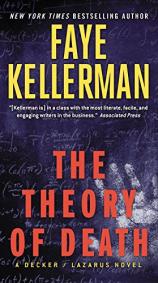The Theory of Death: A Decker/Lazarus Novel
Review
The Theory of Death: A Decker/Lazarus Novel
After more than two dozen novels, Faye Kellerman continues to impress and mightily so. THE THEORY OF DEATH is the 23rd book to feature Peter Decker and Rina Lazarus, a husband-and-wife crime-solving duo.
Kellerman put a swerve on her loyal audience in MURDER 101 by moving Decker, an LAPD police lieutenant, and Lazarus out of southern California and into upstate New York, where Decker is serving with the rural Greenbury police department. Kellerman continues to demonstrate that she is not reticent to develop and age her long-running characters while introducing new ones, including Tyler McAdams, the somewhat abrasive and, yes, irritating Greenbury police detective who was paired with Decker in MURDER 101 and makes a somewhat unexpected return in this new go-round, which is as solid a police procedural as you are likely to read this year.
"THE THEORY OF DEATH is perfectly paced, full of quirky and, yes, malevolent characters populating a puzzling mystery, which, at its heart, concerns whether or not a crime actually has been committed."
Kellerman wastes little time in getting things rolling in THE THEORY OF DEATH. McAdams, who had left the Greenbury department to pursue a law degree at Harvard, abruptly returns to Greenbury for a study break and hits Decker up for a ride from the bus stop and a place to stay. His suitcase is barely in the trunk when Decker gets a call from his boss, Captain Mike Radar (love that name), advising him that a dead body has been discovered deep in a remote location of a local forest. The male victim is nude, with his clothes neatly laid out, but there is no phone or identification to be had. Death appears to be the result of a gunshot wound to the head, and the immediate, though by no means conclusive, evidence points to suicide. Initially just along for the ride, McAdams is more than up for joining the investigation.
Despite his somewhat prickly repartee, McAdams is as sharp as any detective with twice his experience. With a couple of his suggestions, combined with Decker’s long-running expertise, the victim is identified in short order as Elijah “Eli” Wolf. Eli was a student at nearby Kneed Loft College, a center of higher learning specializing in math and science for the brightest of the brightest. Of these, Eli was regarded as the best, a student whose existence was grounded in mathematics and who otherwise had minimal contact with the material world. Those who knew him did not know him well, but are pretty much in agreement that he did not exhibit any tendencies toward suicide. At one point he is even described as somewhat upbeat, given that he was wrapped up almost entirely in his all-but-incomprehensible math thesis.
It remains that Eli is deceased, though, and it is up to Decker and McAdams to determine if he became that way voluntarily or otherwise. Their investigation uncovers a multitude of other sins and, as a result their digging, is resented both on and off campus. Still, Decker and McAdams are up to the task, and along the way there are a number of surprises, including a bit of higher math that Kellerman somehow makes interesting, even to those of us who, shall we say, were socially promoted with respect to such matters.
THE THEORY OF DEATH is perfectly paced, full of quirky and, yes, malevolent characters populating a puzzling mystery, which, at its heart, concerns whether or not a crime actually has been committed. Kellerman keeps the reader guessing until the end, which, alas, comes all too quickly. This is one book that you will wish would just go on and on to infinity, if you catch my drift.
Reviewed by Joe Hartlaub on November 13, 2015





